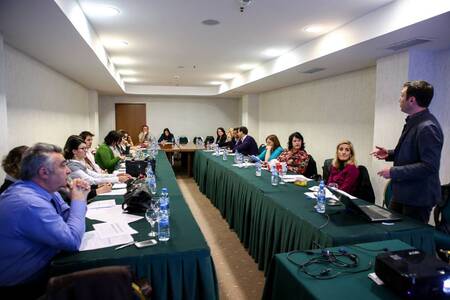 When Gordana Nestorovska went to primary school, there was no inclusive education whatsoever, not even discussion about it. Children with special needs went to special, completely different schools that the ones she attended. They were not included in regular classes and there was no debate on how to help them.
When Gordana Nestorovska went to primary school, there was no inclusive education whatsoever, not even discussion about it. Children with special needs went to special, completely different schools that the ones she attended. They were not included in regular classes and there was no debate on how to help them.
“Now children with special needs come to regular schools and we are continuously working to include them as much as possible. There is a significant change of approach in the schools from all those involved. However, a lot more needs to be done. Further education and training for teachers is needed. But if the Regional Policy Recommendations are implemented as planned, a major step forwards will have been made in terms of inclusive education, particularly for children with special needs”, says Nestorovska, a psychologist in the primary school “Joakim Krcovski” in Skopje.
She is one of some 20 teachers, principals, psychologists and other members of the three regional networks on inclusive education that participated in the workshop for the endorsement of the Regional Policy Recommendations for Inclusive Education that was held in Skopje on 13 April 2015. It is one of seven workshops organised by the Joint EU/CoE project Regional Support for Inclusive Education for a final evaluation of the Regional Policy Recommendations for Inclusive education. In total similar workshops were held also in Tirana, Belgrade, Sarajevo, Zagreb, Pristina and Becici.
The goal of these recommendations is to help the development of regional policy changes that will bring greater inclusion in the schools. Once the evaluation meetings are completed, the recommendation will be submitted to beneficiary-level policy makers, who should translate them into policy actions.
Three networks created with the support from the Project - inclusive PolicyNet, SchoolNet and TeacherNet have jointly worked on this issue through consultation, exchange of knowledge, ideas and experience.
“One of the biggest benefits of this process of creating and evaluating the policy recommendations is the regional cooperation, the networking itself and the establishing of contacts which we continuously use for exchange of experiences and for joint projects. We have already started applying for funds jointly with schools from the region”, says Dushko Perinski, a high school teacher at the Municipal high school “Mosha Pijade” in Tetovo.








